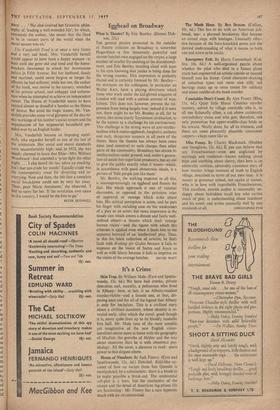Egghead on Broadway
TH.E general picture presented to the outsider of theatre criticism on Broadway is somewhat Hogarthian—a few immensely powerful and sinister hatchet-men engaged on the corpse, a large number of smaller fry assisting at the disembowel- ment, and Eric Bentley standing aloof with tears in his eyes knowing that justice is being done for the wrong reasons. This impression is probably shared and is certainly fostered by Mr. Bentley— his strictures on his colleagues, in particular on Walter Kerr, have a pitying directness which those who work under the kid-gloved etiquette of London will read with a certain amount of wist- fulness, This does not, however, prevent the im- pression from being largely true; indeed if it were not, there might be no Mr. Bentley at all, for he seems, like some sturdy Toynbeean civilisation, to be the answer to a challenge by his environment. This challenge is the strong wave of anti-intellec- tualism which makes eggheads, longhairs, esthetes and such, dangerous suspects in all parts of the States. Since the theatre has always been more open (and sensitive) to such charges than other parts of the community, Broadway has driven its intellectualism under ground, and, under a genera- tion of astute but superficial producers, has set out to give the public exactly what it wants—which, in accordance with good democratic ideals, is a picture of 'little people just like them.'
Mr. Bentley, the walking response to all this, is uncompromisingly an egghead and flaunts the fact. His whole approach is one of rational discussion, as opposed to the primitive cries of approval or outrage which echo about him. His critical perception is acute, and he puts his finger with unfailing ease on the weaknesses of a play or an actor; but more impressive is the steady aim which covers a distant and fairly well- defined object—a theatre which shall 'enlarge human vision'—and the rigour with which this criterion is applied even when it leads him to the apparent betrayal of an 'intellectual' play. Thus, in this his latest collection of articles, he finds fault with Waiting for Godot because it fails to improve on the vision of Sartre and Joyce as well as with Marty because it fails to improve on
the vision of the average butcher. DAVID WATI


































 Previous page
Previous page